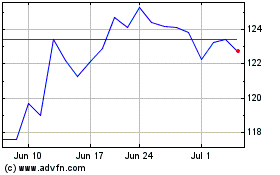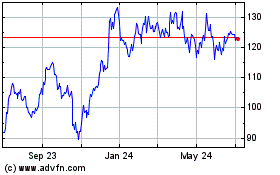Family Leave Gaining Momentum in the Workplace
January 05 2016 - 8:11PM
Dow Jones News
By Rachel Emma Silverman
Big changes at blue-chip companies last year changed life for a
lot of new parents, but there is still a long way to go.
Amazon.com Inc., Microsoft Corp., Accenture, Netflix Inc.,
Blackstone Group LP, Nestlé SA and others have expanded paid leave
for new parents and added benefits such as shipping breast milk and
paying for family nannies to travel with employees on business
trips.
At Netflix, employees can take up to a year of paid leave to
care for a child, while Amazon also increased time off for fathers
and adoptive parents, in addition to birth mothers.
Benefits experts say that trend will continue in 2016, as
companies court millennial employees who are beginning to start
families and seeking roles that allow greater flexibility.
Experts also expect to see more workers thinking beyond leave,
figuring out ways employees can balance the demands of work and
family after they return to the job. Accenture allows new parents
to cut back on business travel during that first year, and
private-equity firm KKR & Co. and investment bank Credit Suisse
Group AG now pay for infants and child care providers to travel
with new parents who have to be on the road.
The big question in 2016 will be whether new parents will take
those extended leaves--and what happens when they return to the
office.
"It's one thing to offer a benefit, but if employees feel like
they can't take advantage of it, it's not doing them any good,"
says Karen Rubin, managing director, North America, of Talking
Talent, which provides coaching to firms such as Deutsche Bank,
Bank of America and McKinsey & Co. on family leave
transitions.
Some firms, such as Credit Suisse are using data analytics to
carefully track whether changes to its leave policy have an impact
when it comes to retaining and hiring women. Returning from a
maternity leave is a turning point that often results in attrition
for female employees, human resources leaders say.
To ease workers' qualms about taking long leaves, KKR, Credit
Suisse and others are introducing parental-leave coaching to train
both parents and managers as to how to handle monthslong
leaves.
Company executives and bosses must set the tone by applauding or
promoting employees who take leaves, or by taking significant
leaves themselves, say work-and-family experts and HR
consultants.
Facebook Inc. founder and chief executive Mark Zuckerberg won
plaudits after announcing he would take a two-month paternity leave
following the birth of his daughter late last year, a long time for
a chief executive but less than the four months of paid leave the
company offers to all employees.
Yahoo Inc. chief Marissa Mayer said she would take only a
"limited time away" following the birth of her twins in December.
Her decision has been criticized by some, but she may have had
little choice as Yahoo goes through a critical period where it is
considering a sale of its core businesses.
Under Ms. Mayer, however, the company expanded paid leave to as
much as 16 weeks.
As of now, most companies pumping up parental benefits are in
fields such as technology and finance, where the fight for talent
is fierce and where women are underrepresented. Less progress is
being made in companies with a more diversified workforce.
Only about 13% of workers have access to paid family leave,
according to Bureau of Labor Statistics data and the U.S. remains
one of few countries not to mandate paid leave for mothers.
Washington, D.C., is weighing one of the most generous
family-leave measure in the country, which would require employers
to offer 16 weeks of paid leave to care for a newborn or sick
family member. The bill, however, faces opposition from some
businesses that contend a mandate would be burdensome.
Paid-leave laws are floating around Congress and the issue is a
centerpiece of Democratic presidential candidates' platforms. In
this election year, however, individual businesses and
municipalities are likely to be the ones driving the biggest
changes.
Write to Rachel Emma Silverman at rachel.silverman@wsj.com
(END) Dow Jones Newswires
January 05, 2016 19:56 ET (00:56 GMT)
Copyright (c) 2016 Dow Jones & Company, Inc.
Blackstone (NYSE:BX)
Historical Stock Chart
From Mar 2024 to Apr 2024

Blackstone (NYSE:BX)
Historical Stock Chart
From Apr 2023 to Apr 2024
